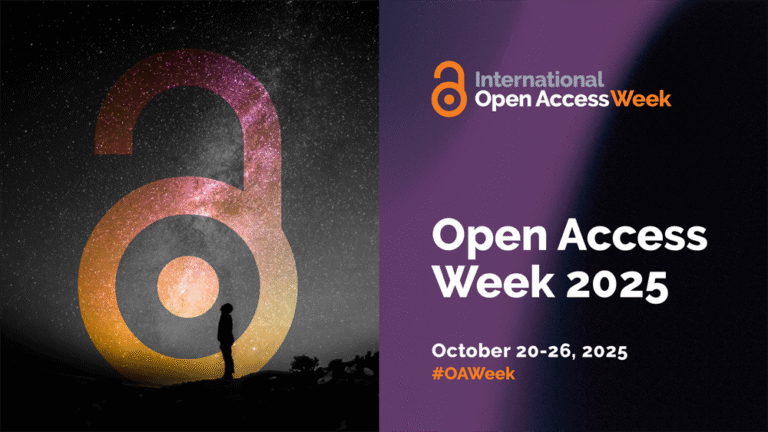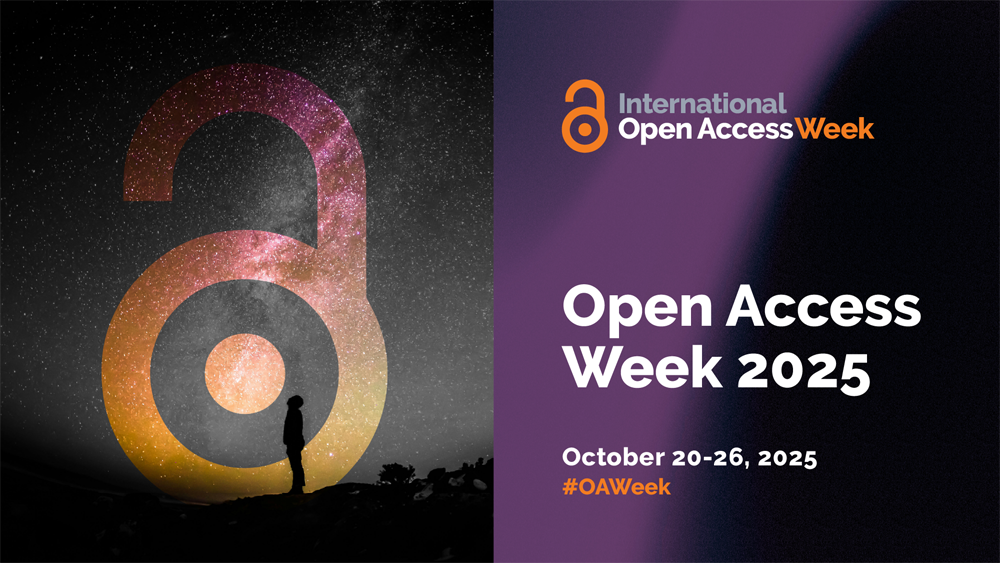Open Access Week Highlights 2025
Posted: October 30, 2025
The library successfully celebrated International Open Access (OA) Week from Oct. 21-27, under the theme “Who Owns Our Knowledge?” The week explored the core mission of Open Access—ensuring free, immediate, and unrestricted online availability of research—while examining how the movement is shaped by the rapid rise of artificial intelligence (AI) and digital technologies. OA is a commitment to equitable knowledge sharing, crucial for accelerating discovery, especially in healthcare, by removing financial paywalls.
Key Focus Areas and Highlights
The library focused on four main areas throughout the week, offering both foundational understanding and actionable steps:
AI and Open Access Together: Charting a Course for Ethical Sharing
Addressing the ethics of knowledge creation in the age of AI, Open Access is a powerful ally to AI in the pursuit of faster, more inclusive research dissemination. Thoughtfully integrated, AI and OA can:
- Enhance Discoverability: AI-powered indexing makes open research more visible.
- Expand Reach: AI enables multilingual translations and accessibility features.
- Improve Efficiency: It helps publishers manage costs and accelerate dissemination.
However, there are challenges, including the risk of AI-generated content lowering quality and the potential for misuse of copyrighted material. The key takeaway was that the success of combining OA and AI hinges on the guiding principles of transparency, inclusivity, and integrity.
Thinking About Publishing with Cureus: A Zero-Cost OA Option
For researchers looking for an open publishing avenue, the library featured Cureus, an open access, peer-reviewed medical journal published by Springer Nature. It offers significant practical benefits:
- Zero Publication Fees: It provides an invaluable zero-cost pathway to immediate Open Access for quality articles.
- Rigorous Process: It maintains a comprehensive, transparent, multi-phase peer-review process.
- Global Exposure: Indexing in major databases like PubMed and Google Scholar ensures maximum visibility.
Cureus’s mission to make medical knowledge freely accessible aligns perfectly with the Open Access ethos.

Discover Research from Around the World with SciELO: Global Perspectives
To encourage broader research discovery, the library introduced the Scientific Electronic Library Online (SciELO). This powerful open access platform is a vital resource for scientific journals produced across Latin America, the Caribbean, Spain, and Portugal. SciELO’s objective is to ensure the universal visibility and accessibility of scholarly literature from developing countries. The platform includes resources like:
- SciELO Data: A repository for research data.
- SciELO Books: A hybrid collection of scholarly eBooks.
- SciELO Preprints: A space for sharing manuscripts pre-acceptance.
Exploring SciELO encourages engagement with diverse global research perspectives, reinforcing the international nature of knowledge.
Explore Open Educational Resources (OER) for your Classroom
The final focus turned to instruction, highlighting Open Educational Resources (OER)—freely and publicly available teaching and learning materials (textbooks, syllabi, media) that can be freely used, adapted, and redistributed. OER integration offers major advantages:
- Removes Cost Barriers: It eliminates the expense of course materials for students, promoting equity.
- Enhances Learning: It supports flexible learning and can incorporate diverse voices.
- Freedom in Teaching: Open licenses allow faculty to adapt and localize materials to fit unique curricula.
Faculty were encouraged to explore resources like OpenStax and MERLOT to enrich their teaching and support affordable medical education.
In conclusion, Open Access Week 2025 was a successful opportunity to not only celebrate the principle of open knowledge but also to provide the community with practical tools and resources for engaging with the future of scholarly communication. The A.T. Still Memorial Library remains a dedicated partner, ready to assist in navigating publishing decisions, locating open resources, and continuing the critical conversation about how to ensure knowledge is open, equitable, and responsibly shared.
